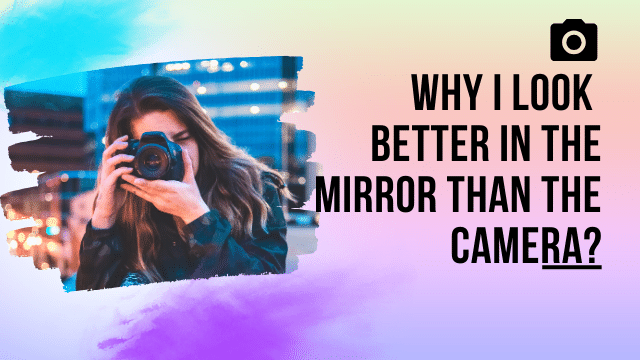Have you ever questioned why your reflection in the mirror seems more appealing than photos taken with a camera? This phenomenon has intrigued many, and in this article, we will explore the science behind this optical illusion.
Unlocking the Mystery: Why Mirror Reflections Trump Camera Shots in Self-Perception?
Have you ever pondered the disparity between the captivating image you see in the mirror and the seemingly less flattering one captured by the camera lens? The answer lies in a complex interplay of optics and psychology. Mirrors present a reversed, flipped version that often enhances our perceived facial symmetry and features, contributing to a more favorable self-image. On the contrary, cameras freeze a static moment, exposing asymmetries and details differently. Lighting, angles, and the absence of mirroring all play roles in this divergence. Moreover, our brains, accustomed to the mirrored view, can create a preference for it, fostering a perceptual bias. This phenomenon, experienced by many, delves into the intricacies of self-perception, touching upon optics, psychology, and the quest for the idealized reflection.🔍✨
The Mirror Illusion
Looking in the mirror provides a flipped, reversed image, often altering our perception of facial symmetry and features. This illusion contributes to the belief that we look better in the mirror.
Camera Capture Challenges
Cameras capture a static, unflipped image, highlighting asymmetries and details differently than our mirrored reflection. The lens, lighting, and angles play pivotal roles in the final photograph.
Psychological Factors
Our brains are accustomed to the mirrored version, creating a preference for that image. The unfamiliarity of a non-mirrored photo can lead to a perceived discrepancy in attractiveness.
Dynamic vs. Static
Mirrors reflect dynamic, real-time images, while photos capture a single moment. Movement and expressions in the mirror contribute to a livelier and potentially more favorable self-perception.
Researcher’s Answers
**Q: Does everyone experience this mirror-camera paradox?**
A: Yes, the mirror-camera paradox is a common phenomenon experienced by many individuals, and its perception varies based on personal preferences and psychological factors.
**Q: Can adjusting camera settings mitigate the disparity?**
A: While adjusting camera settings can influence image quality, the fundamental difference lies in the dynamic nature of mirrors versus static photographs. Adjustments may help but won’t entirely eliminate the gap.
**Q: Are there psychological implications of this perception difference?**
A: Yes, the discrepancy can impact self-esteem and body image. Understanding the psychological aspects is crucial for fostering a healthy self-perception.
**Q: Can practicing posing improve how one looks in photos?**
A: Yes, practicing posing and becoming familiar with preferred angles can enhance photogenic qualities, bridging the gap between mirror and camera perceptions.
In conclusion, the mirror-camera paradox is a multifaceted phenomenon influenced by optics, psychology, and personal preferences. Acknowledging these factors can lead to a more nuanced understanding of our self-perception.
FAQ:
1. Why is a mirror better than a camera?
Delving into the intricacies of optics and perception, a mirror takes precedence over a camera due to its unique ability to present a reversed and flipped image. This phenomenon enhances facial symmetry and features, contributing to a more favorable self-perception. Mirrors provide a dynamic, real-time reflection, whereas cameras capture a static moment, leading to differences in perceived attractiveness.
2. Why does a bathroom look better in a mirror?
Bathrooms often radiate a distinct charm when adorned with mirrors, creating an aesthetically pleasing ambiance. The play of light, spatial arrangement, and reflective surfaces within a bathroom contribute to a visually appealing atmosphere. Mirrors amplify the sense of space and brightness, enhancing the overall perception of the environment.
3. Why does my face look like a mirror?
The perception of one’s face resembling a mirror is rooted in the psychological comfort derived from the familiarity of one’s own reflection. This phenomenon creates a preference for the dynamic and reversed image presented in the mirror, shaping an individual’s self-perception.
4. Do you look better in your head than on camera?
The common experience of looking better in one’s head than on camera stems from the interplay of lenses, angles, and the static nature of photographs. The dynamic and familiar reflection in the mind’s eye contrasts with the captured moment, leading to a perceived discrepancy in attractiveness.
5. Is a mirror how others see you?
While mirrors offer a personalized and dynamic view, they do not precisely reflect how others see you. The perception of individuals may vary, and factors such as lighting, angles, and personal perspectives contribute to differences in the way others perceive your appearance.
6. Are mirrors accurate?
The accuracy of mirrors is subjective, influenced by personal perspectives and individual experiences. While mirrors provide a dynamic and real-time reflection, the interpretation of accuracy depends on the context and the specific aspects being observed.
7. Why do my eyes look better in the mirror?
The captivating allure of eyes in the mirror is attributed to factors such as favorable lighting, angles, and the interactive nature of the reflection. Mirrors often highlight the eyes’ natural beauty, contributing to a more appealing and aesthetically pleasing appearance.
8. Why do I look fat in pictures but not in the mirror?
Discrepancies in the perception of body image between pictures and mirrors can be attributed to the interplay of lenses, angles, and the frozen moment captured by the camera. Mirrors, offering a dynamic and real-time reflection, may present a more flattering view, while pictures capture a single moment, emphasizing different aspects of one’s appearance.


